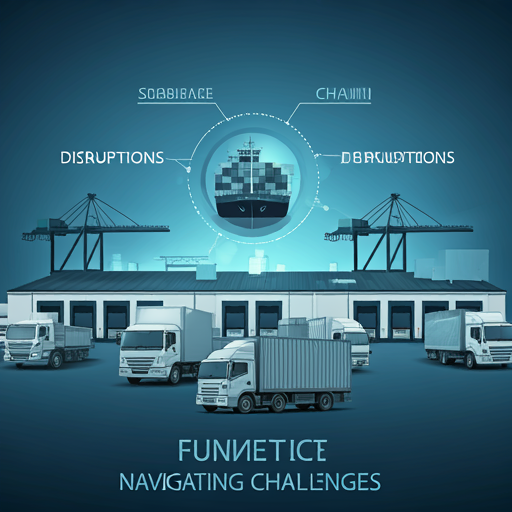Navigating the Global Supply Chain Disruptions
Introduction to Supply Chain Disruptions
Supply chain disruptions have become increasingly prevalent in today’s interconnected economy. These interruptions can stem from various factors, including geopolitical tensions, natural disasters, and pandemics. Such events can lead to significant delays and increxsed costs for businesses. Companies must adapt to these challenges to maintain operational efficiency. The impact on global trade is profound. It affects not only large corporations but also small enterprises. Understanding these dynamics is crucial for strategic planning. Awareness is key in navigating these complexities.
The Role of Cryptocurrency in Supply Chains
Cryptocurrency can enhance supply chain efficiency through increased transparency and reduced transaction costs. It allows for real-time tracking of goods, which minimizes delays. This technology can also facilitate cross-border payments, streamlining international trade. Many companies are exploring blockchain solutions for better data integrity.
Key benefits include:
These advantages can significantly mitigate disruptions. Awareness of these tools is essential for modern businesses.
Understanding Supply Chain Dynamics
Key Components of Supply Chains
Supply chains consist of several key components that work together to deliver products efficiently. These components include suppliers, manufacturers, distributors, and retailers. Each plays a vital role in ensuring that goods reach consumers in a timely manner. Understanding these roles is essential for effective management.
For instance, suppliers provide raw materials, while manufacturers transform these into finished products. This process requires coordination and communication. Effective logistics is crucial for minimizing delays.
He must consider all elements carefully. Each link in the chain matters.
Factors Leading to Disruptions
Several factors contribute to supply chain disruptions, including natural disasters, geopolitical tensions, and economic fluctuations. These events can create significant delays and increase costs. For example, a hurricane can halt production and transportation. This leads to shortages in the market.
Additionally, labor strikes can disrupt operations. He must consider these risks in planning. Awareness is crucial for effective management.
Impact of COVID-19 on Global Supply Chains
Short-term Effects on Supply and Demand
The COVID-19 pandemic has caused significant short-term effects on supply and demand across various sectors. Disruptions in manufacturing and logistics have led to product shortages. This has resulted in increased prices for essential goods.
For instance, skincare products faced supply constraints. Consumers experienced delays in receiving items.
Key impacts include:
He must adapt to these changes. Awareness is essential for planning.
Long-term Changes in Supply Chain Strategies
The COVID-19 pandemic has prompted long-term changes in supply chain strategies. Companies are increasingly prioritizing resilience and flexibility in their operations. This shift often involves diversifying suppliers to mitigate risks. He must consider multiple sourcing options.
Additionally, businesses are investing in technology to enhance visibility. Improved data analytics can lead to better decision-making.
Key changes include:
These adaptations are essential for future stability. Awareness of these trends is crucial.
Cryptocurrency as a Solution
Enhancing Transparency and Traceability
Cryptocurrency can significantly enhance transparency and traceability in supply chains. By utilizing blockchain technology, companies can create immutable records of transactions. This ensures that every step in the supply chain is documented. He must consider the benefits of such systems.
Key advantages include:
These features are vital for consumer trust. Awareness of these solutions is essential.
Facilitating Cross-Border Transactions
Here are 10 trending article titles for a financial website based on the latest news and analysis: No input data
Case Studies of Cryptocurrency in Supply Chains
Successful Implementations
Several companies have successfully implemented cryptocurrency in their supply chains. For example, a major food retailer used blockchain to track product origins. This enhanced transparency and reduced fraud risks. He must recognize the importance of such innovations.
Key implementations include:
These cases demonstrate the potential benefits. Awareness of these successes is crucial.
Lessons Learned from Failures
Several case studies highlight failures in cryptocurrency implementations within supply chains. For instance, a logistics company faced significant security breaches. This led to loss of sensitive data and financial resources. He must learn from these mistakes.
Key lessons include:
These failures emphasize the necessity of careful planning. Awareness of potential pitfalls is essential.
Future Trends in Supply Chain Management
Integration of Blockchain Technology
The desegregation of blockchain technology is poised to transform supply chain management significantly. This yechnology enhances transparency and traceability, which are crucial for consumer trust. He must consider its potential benefits.
Key trends include:
These advancements can lead to improved efficiency. Awareness of these trends is vital for strategic planning.
Emerging Cryptocurrencies and Their Potential
Emerging cryptocurrencies are gaining traction in supply chain management. These digital assets offer innovative solutions for transaction efficiency and cost reduction. He must evaluate their potential impact.
Key benefits include:
These features can enhance operational agility. Awareness of these developments is essential for strategic decisions.
Conclusion and Recommendations
Strategic Adoption of Cryptocurrency
Strategic adoption of cryptocurrency can enhance operational efficiency. Companies should assess their specific needs before implementation. This ensures alignment with business goals. He must prioritize security and compliance measures.
Key recommendations include:
These steps can mitigate risks effectively. Awareness is crucial for successful integration.
Preparing for Future Disruptions
Preparing for future disruptions requires proactive planning and adaptability. Companies should develop comprehensive risk management strategies. This approach helps mitigate potential impacts on operations. He must regularly assess supply chain vulnerabilities.
Key actions include:
These measures enhance resilience against unforeseen events. Awareness of potential risks is essential for success.
